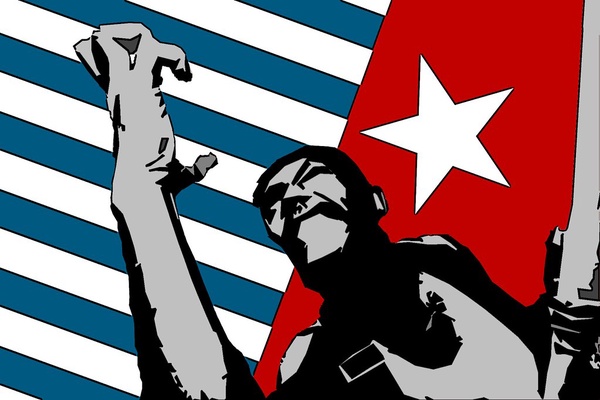
To commemorate Human Rights Day on 10 December 2020 — which was adopted in 1948 by the Universal Declaration of Human Rights (UDHR), the role of music as a right, and as an expression, is celebrated.
It’s worth noting here that the intrinsic power of music is possibly one of the greatest tools we have to promote our inalienable rights, given that the UDHR was a milestone document proclaiming these rights – regardless of race, religion, political or other opinion.
For most of us, music captivates and inspires us in so many ways. It is a language that can be understood by anybody as it creates within us a deeper sense of hope and courage.
In West Papua, music functions as a unifier in maintaining the spirits of our people despite the struggle. We have grown up with horrific repression and violence – things that do not need others to raise in our consciousness. But outside of West Papua, music is vital for raising awareness about our struggle, which is necessary since world leaders are often complicit in perpetuating, and the ban on foreign media long imposed by the Indonesian government does not help either.
Evidently, this is the case for a young West Papuan musician Kris Douw, who has written freedom songs to uplift the spirit of national liberation struggle against Indonesia’s brutal colonisation of his homeland. Last month, it was reported that he had been assaulted.
Musician Douw’s fate may not be of the same magnitude as other music pioneers such as Arnold Ap, a folk musician who was murdered in detention in 1984, and the Mambesak group as well as the legendary band Black Brothers, who were forced into exile because of their revolutionary music. But one thing they have in common is that their music acts as a conduit to convey basic human rights: the freedom of cultural and political expression.
As many human rights defenders around the world will call to respect human rights and eradicate all forms of violence against humanity on this day, we have sung over the years against human rights violations – including extra-judicial killings, unlawful arrests, violence against civilians, and violations against the right to peaceful assemblies and opinions – committed by the Indonesian military and security forces.
The deteriorating human rights condition and political climate have influenced Kris Douw and his music group, Pamerrasta, to express his ideas and feelings in a song.
The powerful combination of the catchy lyrics, footage and ‘wisisi’ music – a traditional musical sound from the central highlands of West Papua – which was released on Youtube on 24 October, brought attention from the security authorities.
What is heroic is that the song title: “OPM TPNPB Siap Lawan NKRI” (or the Free West Papua Movement — West Papua National Liberation Army Ready to Resist Against Republic of Indonesia), and the opening lines describe the defiant act of the West Papua National Liberation Army (TPNPB) against Indonesia’s colonialism and capitalism.
“TPNPB siap maju untuk melawan kolonialisme. TPNPB siap tempur untuk melawan kapitalisme.” (TPNPB [West Papua National Liberation Army Ready to Resist Against Republic of Indonesia] is ready to resist colonialism. TPNPB is ready to defy capitalism.)
Within four weeks of the song being released on social media platforms, photos emerged on Free West Papua Campaign Facebook of Douw being attacked at about 8 am, 21 November, by Indonesian special forces at the Kodim Complex in Nabire, Papua.
He suffered injuries to the face, including several broken teeth, and his body. While it is devastating to read about such human rights abuse, Douw is not alone in using music as a part of the struggle.
Contemporaries of Arnold Ap were the Black Brothers, who had shared the same fate as he did. To date, they are regarded as one of Indonesia’s top bands in the mid-70s and the most popular band of their time in the Pacific Islands. Their radical stance to songs such as “Hari Kiamat” (Judgement Day) and the patriotic song “Laskar Papua” (Papua Troops) shows pride in the West Papua quest for full freedom.
The legacy of musicians like Arnold Ap and the Black Brothers inspires younger generations like Kris Douw to sing the songs of revolution.
There is justice in freedom songs for West Papua— songs speak of the revolution, and the revolution is in the song. In the words of Arnold Ap: “I live to sing, sing to live”.
These profound words by Arnold Ap provide a great way of truth-telling about a government that suppresses it, because it contains human stories captured in the movement of the people of West Papua.
And so, we will not be apologetic about our human rights, our moral responsibilities and our beliefs in the face of the current Indonesian system, which is embedded in completely and utterly abusive and corrupt governance.
In honour of Kris Douw’s music and other music legends, we sing about the memory of suffering as a healing process in our collective movement, we sing about truth and justice in our land, and to remind ourselves and our readers that full freedom for West Papua is possible. Our rights come with responsibilities to engage and support the idea put forward in the UDHR that everyone should be allowed to lead a life of dignity — all of us deserve this universal human right

